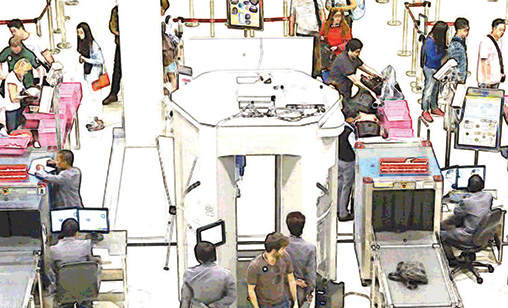Main Story
Unintended consequences
Airlines have mounted a campaign for “smarter” application of bans on onboard personal electronic devices.
June 1st 2017
Plans by the U.S. government to extend its March ban on onboard Personal Electronic Devices (PEDs) beyond the Middle East and North Africa have propelled the controversial ruling to the top of the global airline agenda. Read More » Carriers fear that cargo holds stacked with hundreds of lithium-powered PEDs will threaten safe flight and add layers of cost to airlines already being challenged by over-capacity and reduced yields, the International Air Transport Association said in official correspondence with U.S. and European security and immigration officials.
 |
Last month, when it was revealed the U.S. government was considering an extension to its onboard PED ban beyond the countries announced in March, airline safety experts said they were concerned about the danger of inflight fires in an area of an aircraft that cannot accessed by crew.
In mid-May, the U.S. Department of Homeland Security spokesman, David Lapan, told reporters in Washington DC that countries being assessed were “not solely Europe” and that an expansion of the bans “was likely”. He said “talks would consider the scale and scope” of the ban.
As the news circulated in the industry, the International Air Transport Association (IATA) announced that its director general and CEO, Alexandre de Juniac, had written to the U.S. Homeland Security chief, John F. Kelly, and the European Commission’s commissioner for Transport, Violeta Bulc, to inform them of the “serious concern” its 265 member airlines had about the PED ban.
“If, despite this negative impact, governments agree additional security measures are necessary, we urge the adoption of several short-term measures as alternatives to the broad extension of the current ban,” de Junaic said.
“These alternative measures would avoid the concentration of lithium battery-powered devices in the cargo holds of passenger aircraft, which is deemed to create an additional safety threat.”
De Juniac said the current U.S. PED ban affects 350 flights per week from the Middle East and North Africa. If extended to all of Europe, it would additionally impact 390 flights a day or more than 2,500 flights a week. This figure could peak at 3,250 flights weekly in Europe during the peak northern summer holiday season.
 |
 |
IATA estimated the impact of an extended PED ban amounted to $1.1 billion annually. It warned the U.S. and Europe that businesses would cancel trips rather than risk laptops that contained confidential company information being removed from their owners before boarding. “This would have implications for future investment and business transactions,” the association said.
An extended PED ban meant more airlines would have to pay for extra handling of hold baggage and also for departure delays prompted by increased baggage screening measures. The delays would have a follow on impact on subsequent flights from the same gates.
The ban also increased airlines’ liability for theft or damage of checked PEDs and had the potential to reduce flight frequencies as yields fell because of fewer corporate customers.
There are indications PED bans in the passenger cabin could extend to the Asia-Pacific. Last month, Australia’s prime minister, Malcolm Turnbull, said he was considering following the example of the U.S. and Britain by banning PEDs onboard.
Turnbull said his government was “looking very closely” at bans on flights from some Middle Eastern countries. Australia would “work very closely with our partners around the world” in constantly reviewing aviation security, he said.
The U.S. PED prohibition affects airline passengers travelling from Amman, Jordan, Kuwait City, Cairo, Istanbul, Jeddah, Riyadh, Casablanca, Morocco, Doha, Dubai and Abu Dhabi.
The British ban covers air journeys from Turkey, Lebanon, Jordan, Egypt, Tunisia and Saudi Arabia. The U.S. announced the PEDs ban in March and said it would cover electronic devices if they are bigger than a regular cell phone. Washington feared terrorists could hide a bomb in a laptop made from materials that cannot be detected by airport security screening.
After insistent urging from IATA, the International Civil Aviation Organization (ICAO) opened debate with member states on the standardization of rules for PEDs onboard.
Executive director of the European Aviation Safety Agency (EASA), Patrick Ky, said EASA is responsible for aviation safety in 32 countries and that lithium batteries, considered as dangerous goods, pose a risk of accidental fire. Such outbreaks of fire would be even more difficult to contain if they happened in an aircraft’s cargo hold, he said.
EASA wants airlines to avoid packing all passenger PEDs in a single container. “Should we go further? I don’t think so for the time being. But if we have a fire risk that we think is high, then of course we would take the necessary action,” he said.
 |
| 'The safety and security of civil air transport are top priorities for IATA and its members. IATA fully acknowledges that security remains the primary responsibility of States, and we understand that the U.S., the UK and other States have compelling reasons to mandate the implementation of counter-measures in response to credible threat intelligence. In doing so, however, we urge all regulators to weigh the impacts of such measures on the passenger, the economy and the airlines and therefore consider implementing actions to support our shared objective in this regard' |
| Alexandre de Juniac International Air Transport Association director general and CEO |
ICAO agreed to discussions on the PED ban after the United Arab Emirates, Egypt and other countries affected by it complained their airlines have been unfairly penalized. An ICAO working paper suggested laptops are a greater security risk in the passenger cabin than in the hold, because hidden explosives could be detonated manually.
“The threat to aircraft from concealed Improvised Explosive Devices (IED) has been the greatest security risk to commercial aircraft for some years,” it said.
ICAO asked its experts to weigh this threat against the safety risk of storing a larger number of unattended flammable batteries in a commercial aircraft’s baggage compartment. ICAO’s aviation security panel is expected to deliver its recommendations this month, the organization said.
ICAO cannot impose binding rules, although its influence on safety and security standards meant its findings are largely followed by its 191 member states. According to the working paper, ICAO is looking to “to identify a possible global approach to mitigate the security risk associated with large portable electronic devices”.
Speaking in Seoul at IATA’s Safety and Flight Operations Conference in April, de Juniac called for increased dialogue between regulators and the industry to ensure that industry experience and know-how are incorporated into new regulations and standards on PEDs.
“We have a common interest in safe and secure flights. Yet last month the U.S. and the UK announced that large electronic devices would be banned from passenger cabins on some flights from the Middle East and North Africa,” he said.
“There was no consultation with airlines and the measure challenged public confidence with inconsistencies, while the safety concerns about concentrations of lithium batteries in the aircraft hold have not been adequately considered or addressed.
“The lessons from this are many: governments need to share information. They need to consult with industry and they need to support ICAO as it develops a global aviation security plan.
“The safety and security of civil air transport are top priorities for IATA and its members. IATA fully acknowledges that security remains the primary responsibility of States and we understand that the U.S., the UK and other States have compelling reasons to mandate the implementation of counter-measures in response to credible threat intelligence.
“In doing so, however, we urge all regulators to weigh the impacts of such measures on the passenger, the economy and airlines and consider implementing our recommanded actions to support our shared objective in this regard.”
| Think before banning IATA is seeking more considered implementation of bans on in-cabin personal electronic devices (PEDs). The recommendations are: • Utilizing Explosive Trace Detection (ETD) at primary and secondary checkpoints. It is a widely available and simple tool that can be used on a continuous and random basis on passengers and bags at the boarding gate, without undue negative consequences to service and facilitation levels. • Conducting trace analysis on the PED by visually inspecting the device for signs of tampering and determining the provenance of the device by questioning the passenger as to the purposes for carrying a device. This may include turning on the device. • Deploying behavioral detection officers on both land and airside and use trained canines as a deterrent. • Recognizing trusted traveler programs and the identification of high risk/low risk passengers. • Increasing training of screeners to detect this PED-based threat. |